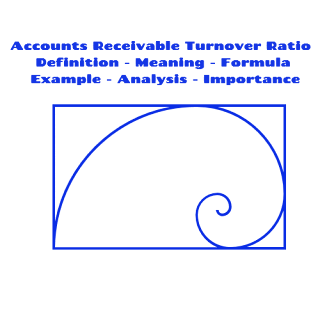Accounts Receivable Turnover Ratio - Definition - Meaning - Formula - Example - Analysis - Importance
You may also be interested in Accounts Receivable Questions And Answers
First of all, we know about what is Accounts Receivable Turnover Ratio.
Note: If you don’t know about Accounts Receivable that is a Current Asset, then check out this article as well.
Accounts Receivable Turnover Definition And Accounts Receivable Turnover Meaning
Accounts Receivable Turnover means that Accounts Receivable Converted Into Cash. So, this ratios shows that how efficient is the company to collect Debt due from its customers within
the Current Accounting Period. In other words, how many times the company takes to receive Cash From its customers for the goods sold or services rendered in the Specified Accounting Period. This ratio is also known as Debtors
Turnover Ratio In British Accounting Style.
Mathematically, it is the ratio of Net Credit Sales To Average Accounts Receivable.
Accounts Receivable Turnover Ratio Formula
Net Credit Sales / Average Accounts Receivable
Here Average Accounts Receivable can be calculated as:
Opening Accounts Receivable + Closing Accounts Receivable/ 2
Example:
If Income Statement of the Company shows the Net Credit Sales For the Period is Rs. 600000 and Balance Sheet Shows Opening Accounts Receivable / Opening Debtors = Rs. 300000 and
Closing Accounts Receivable / Closing Debtors = Rs. 200000, then by the applying the formula, we can calculate Accounts Receivable Turnover as shown below:
600000 / 25000 = 2.4
Average Accounts Receivable = 300000 + 200000 / 2 = 250000
Hence the Ratio is 2.4 which means that company is good in collecting their debt due from customers in Current Accounting Period.
Analysis / Interpretations
If this ratio is high, then it is good for the company but is low and it is not good sign for the company and the company will face heavy loss in future due to non-receipt of dues from
the customers.
But, you must remember that higher value of Accounts Receivable Turnover Ratio does not mean that the ratio is good. In fact, it all depends upon the particular type of industry in which
the company is operating.For Instance, if there is very high Turnover Ratio, then it is very difficult for customers to pay their bills and also it hurts them especially if they are loyal customers of the company. So, effective
level of Accounts Receivable Turnover ratio is good for the business of the company.
Importance / Significance of Accounts Receivable Turnover Ratio
1. This ratio shows whether a company is good in receiving its debts from customers or not.
2. If this ratio is good, then it indicated the company collects its dues from customers but if it is not good, then it shows that there are many debts are still due and there are Customers
who have not Good Credit Standing to pay the bills to company in time or not paid at all.
3. The Strict Policy of Collecting Debts from Customers is not good for the company. It hurts the loyal customers. Simply, as there is some delay due to acceptable reasons e.g. delay
in payment due to illness or other problems arised that prevent them to make prompt payment. So, there is a balance policy and gives customers, the acceptable period of time for paying their dues, especially in case of unavoidable
circumstances.
So, Accounts Receivable Turnover Ratio is measuring yard for the assessing the performance of company in collecting its dues from Customers within the specified Accounting Period.

Comments